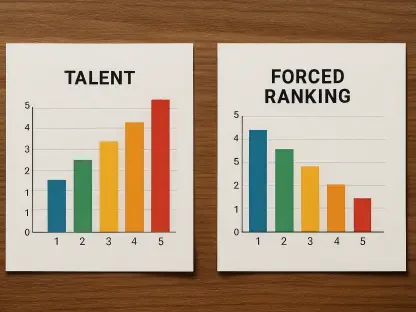What happens when a tech titan, revered for innovation, is accused of bending to political pressure at the expense of its own people? A stunning lawsuit against IBM has surfaced, alleging that the company fired Black executives to align with a controversial executive order from President Donald Trump issued earlier this year. This claim, brought by a former product management director with decades of service, paints a troubling picture of racial discrimination and corporate compliance clashing with ethical standards. It’s a story that pierces the veil of workplace fairness, demanding attention from employees, leaders, and policymakers alike as the battle over diversity in corporate America intensifies.
Why This Controversy Demands Attention
The significance of this legal battle extends far beyond the walls of IBM’s headquarters. It serves as a critical flashpoint in the national discourse over diversity, equity, and inclusion (DEI) programs at a time when such initiatives face unprecedented scrutiny. With Trump’s recent executive order targeting DEI among federal contractors, companies are caught in a vise—balancing internal commitments to equity against the risk of political or legal repercussions. This case could set a precedent for how corporations navigate governmental influence, potentially reshaping policies that affect millions of workers across the United States.
Moreover, for Black professionals, the allegations strike a raw nerve, highlighting fears of being disposable in environments where diversity is often touted but not always protected. The outcome of this lawsuit may influence whether businesses prioritize compliance over fairness, or if they can find a path to uphold both. As tensions mount, the stakes couldn’t be higher for corporate accountability and the future of inclusive workplaces.
The Heart of the Accusation: Racial Bias or Political Play?
At the core of the lawsuit, filed in the U.S. District Court for the District of Maryland, lies a damning assertion: IBM terminated a seasoned Black executive and several of her peers without valid performance reasons. The plaintiff, with 26 years at the company, claims that she and five out of seven Black executives in her division were let go, only to be replaced by less experienced individuals, including an Asian candidate in her own role. This pattern, she argues, suggests deliberate targeting based on race rather than merit.
The timing of these terminations adds fuel to the fire. Coming on the heels of Trump’s anti-DEI executive order, the firings are portrayed as a calculated move to “appease” the administration and secure IBM’s status as a federal contractor. If true, this raises profound questions about how far a corporation might go to align with political directives, even at the cost of its workforce’s trust and diversity principles.
Further complicating the narrative is IBM’s own history with DEI-related litigation. Past lawsuits, supported by groups like America First Legal, have accused the company of discriminating against White employees through diversity initiatives. This duality—facing claims of bias from multiple racial groups—illustrates the tightrope companies walk when implementing equity programs under intense public and legal scrutiny.
Inside Voices: What’s Being Said About IBM’s Actions
Allegations in the lawsuit point to statements attributed to IBM CEO Arvind Krishna, suggesting an explicit intent to comply with the executive order, even if it meant stepping back from DEI commitments. Though these statements remain unverified in public records, their inclusion in the legal filing adds a layer of gravity to the case. If substantiated, they could signal a troubling willingness to sacrifice internal values for external approval.
Legal experts weigh in with caution, noting that any proven violation of Title VII of the 1964 Civil Rights Act, which bans employment discrimination based on race, could result in severe penalties for IBM. A recent survey of HR professionals revealed that 30% of large employers are reevaluating DEI programs due to legal uncertainties following the executive order, indicating a broader industry chill. Analysts also reference IBM’s track record of settling discrimination claims, suggesting that this latest suit could be a costly reckoning if evidence mounts.
Beyond the legal realm, employee sentiments echo a sense of betrayal. Anonymous posts on professional forums describe a growing unease among minority workers at IBM, with some questioning whether their contributions are valued or merely symbolic. These voices, though unofficial, reflect a human toll that numbers and lawsuits can’t fully capture, underscoring the personal impact of corporate decisions.
The Wider Ripple: DEI Under Siege in Corporate America
Trump’s executive order doesn’t just affect IBM—it casts a long shadow over countless organizations reliant on federal contracts. By mandating the rollback of DEI programs, the directive has sparked a wave of uncertainty, with some companies scaling back employee resource groups and inclusion training to avoid perceived “illegal” practices. This shift risks undoing years of progress toward equitable workplaces, as businesses grapple with compliance versus conviction.
Data paints a stark picture: a 2025 report from a leading HR consultancy found that 25% of Fortune 500 companies have reduced DEI budgets since the order’s issuance, citing legal risks as a primary concern. Smaller firms, lacking robust legal teams, face even tougher choices, often opting to abandon initiatives altogether. This trend suggests a potential backslide in diversity gains, disproportionately affecting marginalized groups who rely on such programs for advancement.
The legal landscape remains fluid, with challenges to the executive order winding through courts. A partial injunction was issued by a federal judge earlier this year, only to be stayed by an appeals court, leaving employers in limbo. This uncertainty amplifies the need for clarity on how far political mandates can dictate corporate culture, a question that cases like IBM’s may ultimately help answer.
Charting a Path Forward: Guidance for Companies and Workers
Navigating this fraught terrain requires strategic action from both employers and employees. Companies must prioritize transparency in termination processes, ensuring decisions are tied to clear, documented performance metrics rather than external pressures. Legal counsel can assist in crafting policies that comply with federal rules while preserving core diversity values, focusing on merit-based systems that still foster inclusion.
Employees, especially those from underrepresented groups, should maintain detailed records of performance reviews and workplace interactions to build a strong case against potential unfair treatment. Forming or joining employee resource groups offers a platform to collectively advocate for equitable policies, amplifying individual concerns into actionable change. Staying informed about evolving laws and executive orders equips workers to respond proactively to shifting dynamics.
Beyond immediate steps, a broader dialogue is essential. Industry leaders should collaborate on frameworks that balance compliance with ethical commitments, potentially through coalitions that lobby for clearer federal guidelines. Such efforts could prevent future conflicts, ensuring that diversity isn’t just a buzzword but a sustained priority in corporate strategy.
Reflecting on a Troubled Chapter
Looking back, the allegations against IBM marked a pivotal moment in the struggle over workplace diversity, exposing the fragile balance between corporate ethics and political influence. The lawsuit, with its claims of racial discrimination tied to a presidential directive, illuminated the personal and systemic costs of such conflicts. It forced a reckoning, not just for one company, but for an entire industry wrestling with its values.
Moving forward, actionable solutions emerged as a beacon of hope. Companies were urged to audit their practices rigorously, ensuring fairness in every decision. Employees were encouraged to document their experiences and unite for advocacy. Most critically, the call for clearer federal policies grew louder, aiming to prevent such disputes from recurring. As this chapter closed, the focus shifted toward building workplaces where equity wasn’t a casualty of politics, but a cornerstone of progress.









